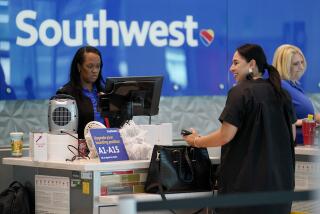Studies find cheaper travel destinations
- Share via
To save a few bucks on your next business trip, stay clear of cities like Paris, London and New York and instead consider trips to such places as Las Vegas, Dallas and New Orleans.
Those are the findings of a study released last week by a major travel website that calculated the cost of visits to the world’s top 50 tourist destinations.
The report by the website TripAdvisor ranked the cities by calculating some basic traveler expenses: the average cost of one night in a four-star hotel, a 5-mile taxi ride, a large cheese pizza and a dry martini.
The most expensive international city was Paris, with a one-day total of $429 in expenses. New York ranked as the most expensive U.S. city, with a total of $367, according to the TripAdvisor report.
The least expensive international city was Bangkok, Thailand, with those expenses totaling $112, and Las Vegas ranked as the least expensive domestic destination, at $164.
A separate study released last week ranked Fort Lauderdale, Fla., as the cheapest U.S. destination city based on another financial factor: taxes.
The study by the research arm of the Global Business Travel Assn., a trade group for business travel professionals, ranked America’s top travel destinations based the combined cost of sales taxes and travel taxes, such as hotel bed taxes.
In Fort Lauderdale, a traveler will spend an average of about $22 on a day’s worth of hotel, car rental and meal taxes, according to the study. Chicago ranked highest on taxes with a total of $39, and New York came in second highest with $37.
“The difference in the effective tax rate on travelers from one city to the next is quiet remarkable,” said Joe Bates, research director for the trade group’s research division.
Los Angeles fell near the middle in both studies. The cost of a hotel, a taxi ride, a pizza and a martini is about $276, according to TripAdvisor. Taxes for a night in a hotel, a car rental and a meal in L.A. add up to $27.
• Full-body scans to become less risque
Those controversial naked-looking scanner images may soon be a thing of the past.
The Transportation Security Administration announced last week that it will begin installing software to let some airport scanners show objects hidden under passengers’ clothes without creating what appears to be a naked digital image of the travelers.
Full-body scanners, criticized by some civil rights groups and others, now operate at 78 airports across the country. The machines use low levels of radiation to look through the clothing of screened passengers and create an undressed image that TSA officials can view to find hidden weapons or other contraband.
But since February, the TSA has been testing a software upgrade that would instead display a generic human form and indicate whether the scanner had detected any foreign objects under the clothes. The technology also shows the TSA agents on what part of the body the object has been found.
About half of the nation’s airport scanners rely on electromagnetic waves to create the images with what is known as millimeter wave technology. The rest of the scanners use X-ray beams, in what is known as backscatter technology.
The TSA plans to add the software in the next few months to 241 millimeter wave machines, including those in the Ontario, San Francisco and Palm Springs international airports. Testing is expected to begin in the fall for the remaining 247 backscatter technology scanners, including those at Los Angeles International Airport.
• Cathay Pacific bans flat-faced pets in cargo
Beginning this month, Cathay Pacific Airways has banned snub-nosed, short-snout and flat-faced dogs and cats from traveling in the air carrier’s cargo hold.
The ban comes in response to a U.S. Transportation Department report that showed such dogs — including boxers, bulldogs and pugs — represented nearly half of all canines that have died on U.S. flights between May 2005 and May 2010.
Veterinarians believe such dogs have trouble breathing in high altitudes and confined spaces. The Cathay Pacific ban extends to flat-faced cats such as Himalayan, Persian and exotic shorthair cats.
More to Read
Inside the business of entertainment
The Wide Shot brings you news, analysis and insights on everything from streaming wars to production — and what it all means for the future.
You may occasionally receive promotional content from the Los Angeles Times.










